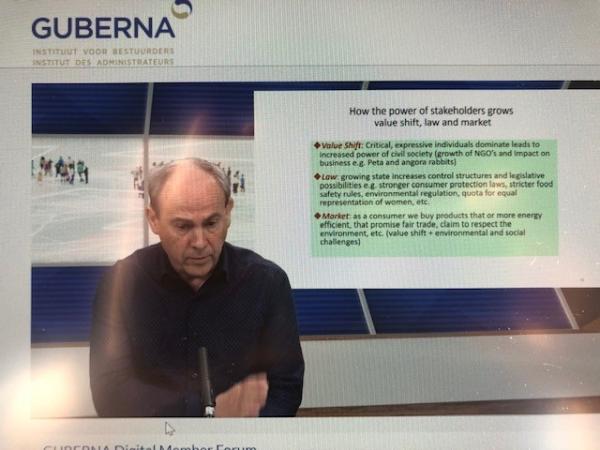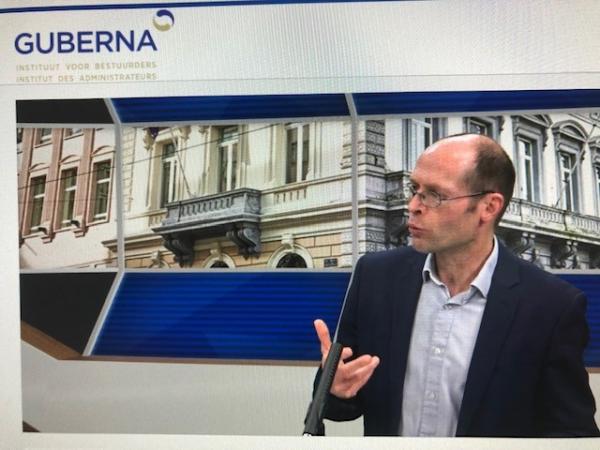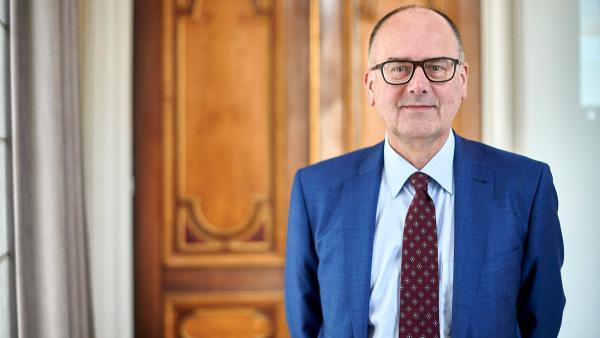Our first digital member forum, for a sustainable future

On 21 April GUBERNA held its first digital member forum. The theme of this occasion was “The implications of the Urgenda case on the accountability of organisations and the climate debate in the light of the Covid-19 crisis”. Before turning towards an overview of the event, it is important to sketch the context. Covid-19 has pushed GUBERNA, just as many other organisations, forward on its journey towards digitalisation. Our first digital member forum is an excellent example thereof, but it is not the only one. We have also started our first fully digital educational programme and have organised our first digital General Assembly, all in the same month! It is, therefore, an understatement to say that in the short term Covid-19 has asked for more flexibility, creativity, and adaption, than we could have ever imagined. However, as Sandra Gobert CEO of GUBERNA, stated at the beginning of the event: this crisis does not just ask for short-term actions but also long-term reflections, given the many lessons learned. This challenging period has shown us, for example, that solidarity is a much more powerful weapon than self-interest, that global collaboration is the way forward and that its driver is technology, and that transformation does not have to be a lengthy process. But most importantly, Covid-19 has made us realise once again the crucial and central role organisations play in our society.
This central role of organisations in society has triggered an interesting debate on how organisations and their governance bodies can push sustainable value creation for all stakeholders. The Urgenda case, a court case in which the Dutch government, based on universal human rights, was held accountable by its citizens for not undertaking enough actions to prevent climate change, has brought this reflection to a much more profound level. If citizens can hold governments accountable for climate change, can they also hold companies accountable and if so, based on what? Urgenda has shown us that it does not matter anymore, to any stakeholder, whether you are in favour or against sustainable value creation. The train for a greener economy and society has already left the station and it is clearly for a one-way trip. At the occasion of its member forum, GUBERNA asked four experts where the train is heading to and what exactly companies should do in case they have missed it?

The first expert of the evening, Professor Luc van Liedekerke, showed us from a historical perspective how the fast growth of economies, populations and welfare worldwide, pushed our planet over and beyond its limits. Our ecological footprint is currently trapped in an exponential curve. As growth is not going to stop, we need to grow differently. Many countries are already moving towards the global sustainability quadrant, the “ideal” situation in which you augment your welfare but stay within the natural boundaries of the planet. But at this moment in time, no country can be situated within this quadrant. However, governments are taking a more prominent role on the domain of sustainability by, for example, increasing legislation. Therefore, it becomes more and more difficult for organisations to ignore the topic. Of course, not just because of the role of states but also because of the changes in society itself, regarding norms and values. Individuals are becoming more and more critical (customers) and therefore more and more people become member of an NGO. The political power of those NGO’s cannot be underestimated. As a result, ignoring sustainability evolutions can be a big risk for organisations. In addition, sustainable development indeed offers a lot of opportunities. Importantly, it is the role of the board to keep an open perspective towards society and sustainability matters.

Professor Olivier De Schutter, the second expert of the evening, provided a concise overview of the legal framework. He indicated that Urgenda is not the only case of its kind, in fact there are a growing number of climate cases in court. The link between climate change and the violation of human rights is becoming ever clearer. There are, for example, more and more committees in the United Nations that focus on the impact of climate change on human rights. Research on this topic is also becoming more advanced. It becomes easier to determine which companies are most responsible for climate change and to which degree. More and more studies show, for example, that global warming can for a large part be attributed to a relatively small number of organisations. Professor De Schutter warned however that, as new standards are determined and both judicial as societal norms change, no company can stay passive. On top of that, as mentioned by professor van Liedekerke as well, companies that take up their environmental and societal responsibilities open themselves up to many advantages. First and foremost, they avoid of course the cost of possible lawsuits, but they are also for example more attractive for current and future employees, for investors, etc.
Jean Viard, a French sociology professor, through his interview with Liesbeth De Ridder secretary-general of GUBERNA, provided us with a broader societal perspective on the topic. When asked whether he thought this health crisis “would become a breaking point that will redesign our current economic model”, he indicated that at first, nothing will fundamentally change as people will try to get back to business as usual. However, some tendencies that were already there before the crisis, but maybe rather weak, will develop themselves in the coming years. For example, the questioning of open economies and globalisation will become more fundamental due to Covid-19. Furthermore, Viard sees politics, especially on the European level, playing a stronger role in negotiating, or finding a balance, with economic powers to protect our fundamental health, food, etc. sovereignty, which according to him we abandoned. This questioning will lead to a democratic reformation based on the principle that we are not just consumers but first and foremost citizens
Jean Viard, a French sociology professor, through his interview with Liesbeth De Ridder secretary-general of GUBERNA, provided us with a broader societal perspective on the topic. When asked whether he thought this health crisis “would become a breaking point that will redesign our current economic model”, he indicated that at first, nothing will fundamentally change as people will try to get back to business as usual. However, some tendencies that were already there before the crisis, but maybe rather weak, will develop themselves in the coming years. For example, the questioning of open economies and globalisation will become more fundamental due to Covid-19. Furthermore, Viard sees politics, especially on the European level, playing a stronger role in negotiating, or finding a balance, with economic powers to protect our fundamental health, food, etc. sovereignty, which according to him we abandoned. This questioning will lead to a democratic reformation based on the principle that we are not just consumers but first and foremost citizens

The last expert of the evening, Bart De Smet, CEO of Ageas, gave us insight into the Ageas approach to sustainability. He underlined that becoming a more sustainable organisation is a long process, which involves many actors, and contains equally as many obstacles. Organisations must make difficult choices as they will be put in front of dilemma’s that might not have been that pressing in the past. For example, do we invest in fossil fuels or do we opt for more sustainable solutions which might have lower returns? When organisations make a conscient choice for a more sustainable approach, other choices must be made as well. As big as the aspirations might be, organisations need to realise that, on a practical level, it is impossible to do everything. Therefore, it is important to measure and report what you are doing now. For example, Ageas measured that its biggest CO2 impact comes from business travels and the daily commutes of its employees. Measuring this enabled them to take concrete actions, like applying more teleworking (already before Covid-19). Ageas also made a conscious choice to focus on 10 SDG’s, etc. Boards have to play their role in all of this and strive for more sustainable value creation. Making profit while creating shared value is possible, though not easy. However, there is no alternative.
After these four prolific interventions, the evening was concluded by a positive call for action by Professor Abigail Levrau, director research & education of GUBERNA. Because our lives are currently centred around flattening the curve and reflecting on lockdown exit strategies, we have almost forgotten that months ago the debate around climate change, sustainable development goals, the EU Green deal, ESG reporting, etc. was gaining more and more momentum. Boards and their directors must realise that this debate will not be erased by a virus and will continue to shape organisations in the future. During the GUBERNA digital member forum, it became clear that organisations who do not take sustainability seriously, will simply cease to exist. The challenge, however, is to find the right balance. We are hopeful that boards and directors will be guided by a new economic and societal compass. Remember, the sustainability train has left the station. Covid-19 might (have) put public transport temporarily under pressure but the train will continue its journey to 2021 and beyond.
Interested to find out more? You can watch the video of the event below.
